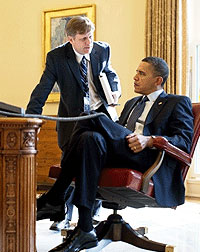U.S. Ambassador Michael McFaul praised the Russia-U.S. reset at the New Economic School
Kristen Blyth - Moscow News - themoscownews.com - 6.9.12 - JRL 2012-105
[DJ: See the presentation here http://www.slideshare.net/NewEconomicSchool/michael-mcfaul-the-reset-theory-results-future]
Michael McFaul, the current U.S. Ambassador to Russia, spoke on Thursday at Moscow's New Economic School with a lecture entitled "The Reset: Theory, Results, Future." Using U.S. President Obama's 2009 visit to the school as his basis for inspiration, McFaul reviewed the initial precepts and current status of the symbolic foreign policy "reset" agreement between Russia and the United States.

file photoMcFaul emphasized the importance of a 'dual-track' engagement between the two countries that is, creating relationships not only in an officially political context, but also among the business and civilian sectors of society. "I am executing our policy of the reset by standing before you and talking to you, not mediated by [the university], and not through the government," he said.
The ambassador, who has weathered criticism from both the Russian press and the Russian Foreign Ministry since taking up his position in Moscow, also discussed the necessity for "non-linkage" between various unrelated issues in order to maintain cooperation and neutralize petty spats and disagreements. He defended the idea of U.S. visa refusal to Russian officials involved in the death of Sergei Magnitsky, which were named on the so-called "Magnitsky List," but also said that, "We think it would be a mistake to have a spitting match over this that would prevent us from doing business deals or cooperating in Syria or Iran."
McFaul was keen to emphasize the overall positive effect of the reset on current Russia-U.S. relations. Trade between the two countries reached an all-time high in 2011, with a total of $42.9 billion, and a recent Gallup poll found that just 2 percent of Americans consider Russia to be "enemy number one" of the United States. A number of progressive agreements regarding adoption laws and visa approval have also recently been reached between the two nations.
The ambassador admitted that there were ongoing tensions regarding Russia's policy towards Georgia, Iran, and Syria. "We fundamentally believe that we are defending America's national interests... If [Russia has] a more accurate assessment of what we are trying to do, will make for better relations between our societies, and better relations between our governments," he said.
McFaul declined to speculate about America's upcoming presidential election and the possible effect that a President Mitt Romney, as opposed to a President Barack Obama, would have on future cooperation between Russia and the United States.
Keywords: U.S.-Russian Relations - Russian News - Russia
[DJ: See the presentation here http://www.slideshare.net/NewEconomicSchool/michael-mcfaul-the-reset-theory-results-future]
Michael McFaul, the current U.S. Ambassador to Russia, spoke on Thursday at Moscow's New Economic School with a lecture entitled "The Reset: Theory, Results, Future." Using U.S. President Obama's 2009 visit to the school as his basis for inspiration, McFaul reviewed the initial precepts and current status of the symbolic foreign policy "reset" agreement between Russia and the United States.
 McFaul emphasized the importance of a 'dual-track' engagement between the two countries that is, creating relationships not only in an officially political context, but also among the business and civilian sectors of society. "I am executing our policy of the reset by standing before you and talking to you, not mediated by [the university], and not through the government," he said.
McFaul emphasized the importance of a 'dual-track' engagement between the two countries that is, creating relationships not only in an officially political context, but also among the business and civilian sectors of society. "I am executing our policy of the reset by standing before you and talking to you, not mediated by [the university], and not through the government," he said.
The ambassador, who has weathered criticism from both the Russian press and the Russian Foreign Ministry since taking up his position in Moscow, also discussed the necessity for "non-linkage" between various unrelated issues in order to maintain cooperation and neutralize petty spats and disagreements. He defended the idea of U.S. visa refusal to Russian officials involved in the death of Sergei Magnitsky, which were named on the so-called "Magnitsky List," but also said that, "We think it would be a mistake to have a spitting match over this that would prevent us from doing business deals or cooperating in Syria or Iran."
McFaul was keen to emphasize the overall positive effect of the reset on current Russia-U.S. relations. Trade between the two countries reached an all-time high in 2011, with a total of $42.9 billion, and a recent Gallup poll found that just 2 percent of Americans consider Russia to be "enemy number one" of the United States. A number of progressive agreements regarding adoption laws and visa approval have also recently been reached between the two nations.
The ambassador admitted that there were ongoing tensions regarding Russia's policy towards Georgia, Iran, and Syria. "We fundamentally believe that we are defending America's national interests... If [Russia has] a more accurate assessment of what we are trying to do, will make for better relations between our societies, and better relations between our governments," he said.
McFaul declined to speculate about America's upcoming presidential election and the possible effect that a President Mitt Romney, as opposed to a President Barack Obama, would have on future cooperation between Russia and the United States.